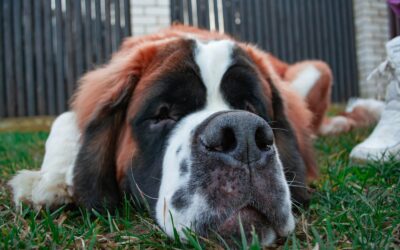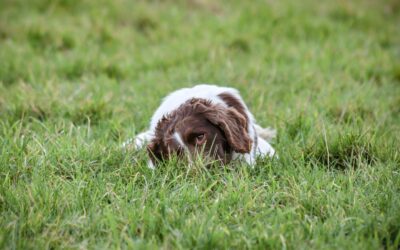If you’ve noticed your dog munching on grass like it’s their favorite treat, you’re not alone. Grass eating is a surprisingly common behavior observed in many dogs, causing concern among dog owners about whether it’s normal or something to worry about. Questions like, “Is my dog sick?” or “Why is my dog eating grass?” often arise. This blog unpacks the reasons behind this behavior, when it’s okay, and how to stop it if necessary.

Is Grass Eating Normal Behavior in Dogs?
Many dogs eat grass, and guess what? It’s not as strange as it might seem. Grass eating is considered a common behavior among dogs of all ages, from younger pups to older companions. Research suggests that for most dogs, occasional grass eating is entirely normal and not necessarily a sign of underlying health issues.
Wild canids like wolves and foxes have been observed consuming plant material, including grass, so this behavior may stem from your dog’s ancestors. A widely held belief is that wild canids ate the entire animal, including stomach contents, which often contained undigested plant material. This could explain why domesticated dogs occasionally gravitate toward grass—it’s ingrained in their DNA!
However, while grass eating is usually harmless, it’s essential to be aware of when it might signal a problem.
Is It Normal for Dogs to Eat Grass and Why?
Grass eating behavior in dogs is relatively common and, in most cases, considered normal. Here are a few reasons why dogs engage in this behavior:
Upset Stomach Relief
One of the most common reasons dogs eat grass is to soothe your dog’s stomach. Some dogs may eat grass to induce vomiting, especially if they’re feeling unwell. The long blades of grass can tickle their throat and stomach lining, which can result in vomiting.
If your dog suddenly starts eating grass excessively and is showing signs of abdominal pain, vomiting frequently, or displaying other health problems, it might indicate an underlying illness. Visiting your vet as soon as possible is essential in such cases.
Dietary Deficiency
Dogs often eat grass when their diet lacks an essential nutrient—usually fiber. A complete and balanced diet is crucial for your dog’s overall well-being. If your dog’s diet isn’t meeting their nutritional needs, they may seek out grass or other non-food items (a behavior called pica) to fill the gap.
Grass can add dietary fiber, aiding the digestive tract and helping dogs pass stool more efficiently. Pet parents feeding a high-quality, balanced diet are less likely to notice their dogs engaging in grass eating due to nutritional deficiencies.
If you suspect a dietary issue, consult your veterinarian. They can recommend changes to your dog’s diet or suggest adding more fiber.
Boredom or Lack of Mental Stimulation
Dogs may eat grass when they’re bored or in need of mental stimulation. This is particularly common in younger dogs or highly active breeds that aren’t getting enough exercise or enrichment.
Providing puzzle feeders, interactive toys, or more playtime can help curb grass eating resulting from boredom. A mentally engaged dog is far less likely to snack on your lawn out of sheer monotony!
Exploration and Sensory Stimulation
Dogs use their senses to explore the world around them, and the texture and taste of grass can provide sensory stimulation. Chewing grass may simply be a way for dogs to engage their jaws and exercise their natural chewing instincts.
It Tastes Good
Believe it or not, your dog might simply enjoy the taste of grass. Some dogs are drawn to the texture or flavor, especially if the grass is fresh, lush, or dew-covered.
If occasional grass eating doesn’t lead to vomiting or health issues, it could just be your dog’s quirky way of enjoying a snack.
Instinct from Their Ancestors
Grass eating in dogs may harken back to their wild ancestors, as discussed earlier. Consuming plant material could have been part of their natural diet, contributing necessary fiber or aiding digestion back then.
Even though most dogs today eat regular food prepared by their pet parents, these instinctual behaviors sometimes remain hardwired into their brain.
Stress or Anxiety
Stress or anxiety can also trigger grass eating in some dogs. Chewing on grass could provide a calming outlet, much like pacing or chewing on toys.
If your dog is stressed, identifying and addressing the root cause—whether it’s separation anxiety, a loud environment, or an unfamiliar routine—should help reduce the behavior.

When to Worry About Your Dog Eating Grass
Occasional grass eating is generally harmless for most dogs, but there are instances where this behavior might indicate a deeper issue. Be concerned if your dog is:
- Eating grass excessively or obsessively.
- Vomiting frequently after eating grass.
- Showing signs of abdominal pain.
- Experiencing diarrhea or other digestive issues.
- Losing weight or appetite.
These could point to gastrointestinal diseases, intestinal parasites, or other medical conditions that require immediate attention. Take your dog to the veterinarian if you notice any of these symptoms.

Signs of Excessive Grass Eating in Dogs
While it’s normal for dogs to occasionally eat grass, excessive grass consumption may indicate an underlying issue that requires attention. Here are some symptoms and signs to watch out for if your dog is eating too much grass:
Frequent Vomiting: If your dog frequently vomits after eating grass, it could be a sign of gastrointestinal irritation or an underlying digestive problem. Persistent vomiting warrants a visit to the veterinarian to determine the cause.
Gastrointestinal Distress: Excessive grass eating accompanied by signs of discomfort such as excessive drooling, diarrhea, bloating, or inappetence may indicate an underlying gastrointestinal issue. These symptoms could be indicative of an infection, food intolerance, or other medical conditions.
Lethargy or Weakness: If your dog displays unusual tiredness, lack of energy, or seems weak after consuming large amounts of grass, it could be a sign that something is amiss. These symptoms may indicate a nutrient deficiency or an underlying health condition.
Avoidance of Regular Food: If your dog consistently shows disinterest in their regular food and instead prefers to consume large quantities of grass, it is important to investigate the underlying cause. This behavior could be a sign of an underlying medical issue or a nutritional imbalance.
Changes in Bathroom Habits: Frequent grass consumption followed by changes in urination or defecation patterns, such as straining to urinate or experiencing difficulty passing stool, may indicate an issue with the urinary or gastrointestinal tract.
If you notice any of these signs or if you have concerns about your dog’s grass-eating habits, it is best to consult with a veterinarian. They can assess your dog’s overall health, conduct necessary tests, and provide appropriate guidance to ensure the well-being of your furry companion.

How to Stop Your Dog from Eating Grass
If your dog’s grass-eating habit concerns you or becomes excessive, here are some practical steps to curb the behavior.
Upgrade Their Diet
Ensure your dog’s food provides a complete and balanced diet. If you suspect a dietary deficiency, switching to high-quality food that meets your dog’s nutritional needs can help. Choose food with more fiber or consult your vet for recommendations.
Provide More Mental Stimulation
Engage your dog with puzzle feeders, interactive toys, and games to keep their mind occupied. This is especially important for grass-eating dogs driven by boredom.
Increase Exercise
A tired dog is a happy dog! Regular walks, play sessions, or time at the dog park can burn off excess energy and keep them from turning to grass out of restlessness.
Eliminate Grass Access
If possible, keep your dog away from areas with grass. Use a leash during walks, create boundaries in your yard, or supervise them during outdoor playtime.
Check for Stress Triggers
Identify any stressors in your dog’s environment and work to alleviate them. Creating a calm, safe space for your pet can reduce anxiety-related grass eating.
Consult Your Vet
If none of these methods work, or if your dog continues to eat grass excessively, consulting with a veterinarian is your best course of action. They can rule out underlying health issues and recommend personalized solutions based on your dog’s needs.

Top Toys and Treats to Distract Your Dog from Eating Grass
If you’re looking for effective ways to divert your dog’s attention from grass-eating behavior, consider these top toys and treats:
Durable Chew Toys
Provide your dog with durable chew toys, such as the Nylabone Dura Chew, to satisfy their natural urge to chew. These long-lasting toys can help alleviate boredom and prevent them from turning to grass as a source of entertainment.
Treat-Dispensing Toys
Treat-dispensing toys, like the PetSafe Busy Buddy, can keep your dog engaged for extended periods. Fill the toy with their preferred treats and let them work to retrieve the rewards, keeping them occupied and less likely to resort to grass-eating.
Flavored Chew Treats
Flavored chew treats, such as the Greenies Dental Treats, can provide a tasty distraction for your dog. These treats not only satisfy their urge to chew but also promote dental health.
Food Topper
Dog food toppers, like the Merrick Beef Bone Food Topper, can offer a long-lasting and satisfying experience for your dog. Ensure to supervise them while they enjoy it.
Interactive Puzzle Toys
Engaging puzzle toys, like the KONG Classic, can keep your dog mentally stimulated and occupied, redirecting their focus away from grass. Fill the toy with their favorite treats or peanut butter for added enjoyment.
Calming Treats
Calming treats, like the Zesty Paws Calming Bites, can help alleviate anxiety or stress that may contribute to grass-eating dogs. These treats contain ingredients known for their calming properties, such as chamomile and valerian root.
Remember to always monitor your dog while using toys or treats and choose options that are appropriate for their size and chewing habits. These products can be purchased from the respective websites mentioned.
Is It Ever Dangerous for Dogs to Eat Grass?
While grass eating is usually harmless, it can sometimes pose risks. Pesticides, herbicides, or fertilizers on treated lawns can be toxic to your dog. Ensure any grass your dog has access to is free of harmful chemicals.
Additionally, some types of grass or plants may upset your dog’s digestive system or cause vomiting, so keep an eye out for unusual reactions.

Snouts and Stouts Indoor Dog Park and Bar offers a climate-controlled play area as well as our Club Canine Cardio. Visit us today!
Final Thoughts | Why Is My Dog Eating Grass?
Grass eating in dogs might be confusing to pet parents, but it’s often a normal behavior with roots in their ancestral instincts. For most dogs, occasional grass eating poses no harm and requires no intervention.
However, if your dog is eating too much grass or showing signs of an upset stomach, nutritional deficiency, or other health problems, it’s essential to address the issue. A visit to your veterinarian and some simple changes—like upgrading their diet or adding mental stimulation—can make all the difference.
Remember, every dog is unique, and understanding your furry companion’s needs is key to keeping them happy and healthy.




